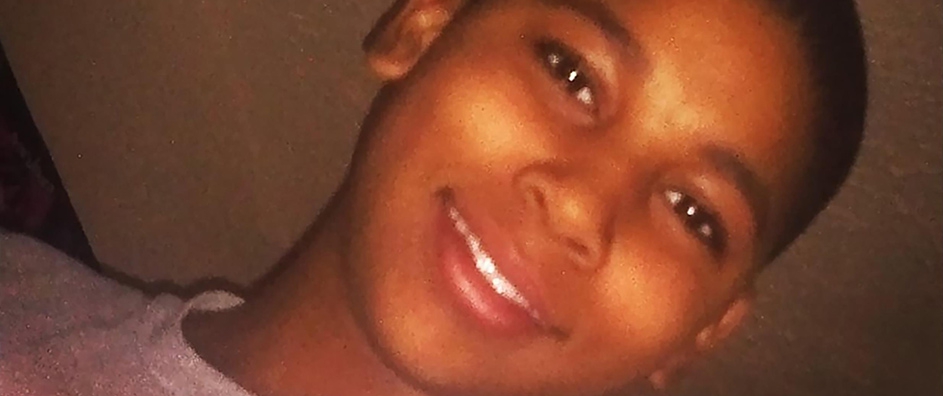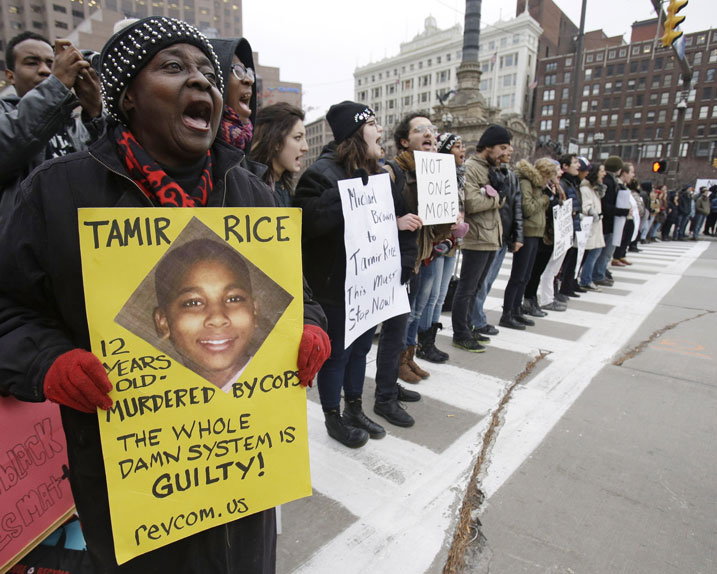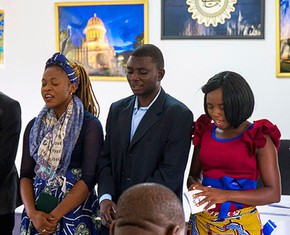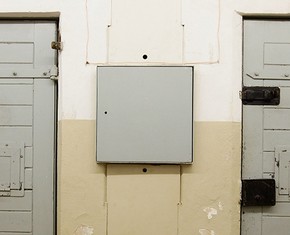The views expressed in our content reflect individual perspectives and do not represent the authoritative views of the Baha'i Faith.
Through our ignorance and lack of viewpoint we divide this common home, we divide the members of this family into various races, we divide religion into different sects and then with those suppositional division we wage war against one another; we shed one another’s blood and we pillage one another’s possessions. Is not this unpardonable ignorance? Is this not the height of injustice? – Abdu’l-Baha, Divine Philosophy, p. 178.
A couple of weeks ago, on a cold day in a Fourth District park in Cleveland, Ohio, a 12-year-old boy and a 26-year-old police officer had a very short but very fatal encounter.
Someone saw Tamir Rice, an African-American boy playing with an Airsoft toy gun, and called 911. “A man pointing a gun at people in a park,” the caller said, “but the gun’s probably fake.” The gun, a replica pistol, was missing the telltale orange safety cap that identified it as a toy. The “man” was a boy.
Timothy Loehmann, a young rookie on the Cleveland police force, responded to the call. In the surveillance video, you can see the police car pull up in front of Tamir. Officer Loehmann exits the passenger side of the cruiser. Then, in just a few seconds, Timothy shoots Tamir.
He died the next day.
A long litany of similar tragedies has recently enraged much of the American populace. The names of the victims—Michael Brown, Eric Garner, Rumain Brisbon, VonDerrit Myers, Jr., Roshad McIntosh, Akai Gurley—keep piling up. If you add the names of people like Trayvon Martin, the unarmed teenager shot and killed by a neighborhood watch volunteer in Florida, the list grows even longer. If you expand the list to include the global toll of race-related tragedies, it becomes massive.
In America, the nationwide protests which have resulted, in some profound ways, aren’t only about the tragic, painful and completely avoidable endings these young men had to face. In one way, the outrage at their needless deaths transcends death itself. In a broader sense, the anger and outrage is about justice, about moral repulsion over systemic bias, racism and injustice.
Simply, African-American families and communities see the devastating consequences as their children, teenagers and young men are killed. Then they consistently suffer from the aftershock when mostly-white review panels or grand juries or political bodies fail to hold their killers accountable, or even allow them to be tried. This enormous injustice feels, to the African-American community, like a wholesale continuation of the treatment they’ve received since they were brought to America in chains.
It feels, in short, like a black life has less importance than a white life.
But often, people who trust America’s justice system to treat them fairly have a hard time understanding that point of view.
Instead, they tend to believe that the police and the courts and the prisons only do what they have to do; that these “incidents” represent individual mishaps rather than a consistent pattern of race-based, officially-sanctioned violence; that criminals get what they deserve; that despite a few exceptions justice is generally served. “Sure,” I heard one white man say a few weeks ago, “the system makes mistakes–but it’s usually fair.” He might not feel that way, I said, if he or his family had ever suffered from some gross personal injustice perpetrated by the justice system itself.
As a result of this huge racial divergence of experience and opinion, a great gulf has developed, with radically different perspectives, feelings and emotions on either side.
In this series of essays about race and fear, we’ll do our best to span that great gulf. We’ll attempt to look beyond the rhetoric, the rage and the rioting over these issues, and objectively consider the root causes. We’ll try to inspect the issues from each side of the fence; we’ll examine the statistics to see if we can find a reasonable way to rationally discuss their ramifications; and we’ll explore how the Baha’i teachings on race and racial unity ask us to deal, both socially and spiritually, with such a vital and challenging issue:
This question of the union of the white and the black is very important for if it is not realized, erelong great difficulties will arise and harmful results will follow … enmity will be increased day by day and the final result will be hardship and may end in bloodshed. – Abdu’l-Baha, quoted in Shoghi Effendi’s The Advent of Divine Justice, p. 33.
Fueled by a complex array of societal pressures, racial hatreds are the fruits of ignorance, of stereotypic misconceptions, of the human tendency to elevate one’s group to a position of superiority over others and of the absence of spiritual values. In the Baha’i view, the blatantly false and misguided premises upon which racism rests must be countered by the truth: that all human beings belong to a single human family, the human race, a family united biologically, socially, and spiritually, while displaying, to the enrichment of the entire planet a limitless variety of secondary physical characteristics. If every person is led to perceive this truth and to welcome those of another skin color as members of his own spiritual family, racism will find a receptive home nowhere and will evaporate of its own accord. It is therefore essential to educate every individual, but especially young children, in the truth of the unity of the human race, a truth confirmed by all the human sciences. – Combating Racism, The Baha’i International Community, August 1988.
You May Also Like
Comments


















"The earth is but one country and mankind its citizens". - Baha'u'llah
What ethnic-racial divide could possibly be worse than the black-white divide in the USA or in my home land, Australia?
Consider the Rape of Nanking four score years ago and consider too the subsequent relations lasting into our time between two races so similar that it's often hard to discern the differences. To neutral observers most young people in ...China, graduates or not, conceal not their detesting of Japan nor their intention of encouraging their kids similarly. Is this not equal to or worse than the black-white divide in the USA? As one who has tried with little success generally and with even less impact among my coreligionists for a quarter of a century to see Abdu'l-Bbaha's solution put into effect I'd like to recount my version of His solution experienced first hand:
In the late spring of 1998 a couple of professional reporters interviewed me about my Esperanto courses at my university in Tianjin. They work for the Esperanto section of China Radio International, where eleven Esperantists are employed by the central government. It was considered newsworthy that several university teachers were among my students of the International Language and noteworthy that Esperanto created amity between the Chinese and Japanese students there. Even among youth on campus today these two races largely remain segregated and mutually hostile due to the aftermath of war. In the first week of July 1998 I made a follow up interview at their ultra modern studio in Beijing. It was quite moving to hear on air in a Communist country Abdu’l-Bahá’s words quoted from 'Bahá’u’lláh and the New Era' as they were broadcast from China to the whole world on July 19 and 26 1998. The same six Bahá’í sentences praising a language in common which go on to thank Dr Zamenhof for his labors were chosen, that I voiced to the entire audience in Shanghai at the close of the First Asian Congress of Esperanto in 1996:
"The greatest means of progress towards the union of East and West will be a common language. It will make the whole world one home and become the strongest impulse for human advancement. It will upraise the standard of the oneness of humanity. It will make the earth one universal commonwealth. It will be the cause of love between the children of men. It will cause good fellowship between the various races."
Baha'i love
Paul